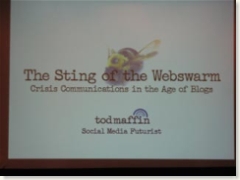The final panel at NewComm Forum featured Brian Oberkirch, Josh Hallett, Joel Richman, and David Parmet, on Managing crisis communications in the blogosphere.
 Joel Richman led off the session with the case of PubSub, in which one of the company’s founders suprised the company’s management and his cofounder by announcing the imminent demise of the company on his personal blog. As a result of the post, virtually all of the key employees quit and gave up on the company. Richman and Parmet were consulting to the company at the time this happened.
Joel Richman led off the session with the case of PubSub, in which one of the company’s founders suprised the company’s management and his cofounder by announcing the imminent demise of the company on his personal blog. As a result of the post, virtually all of the key employees quit and gave up on the company. Richman and Parmet were consulting to the company at the time this happened.
So, what did they learn from this experience? What do you do if employees air dirty laundry into the blogosphere?
 Josh Hallett argued that the blogosphere is a different medium, but that communications professionals should apply the set of experience and skills that they have built up in traditional media. The tried and true best practices will work in the blogosphere.
Josh Hallett argued that the blogosphere is a different medium, but that communications professionals should apply the set of experience and skills that they have built up in traditional media. The tried and true best practices will work in the blogosphere.
And what of accuracy in the emotional statements that rattle around the blogosphere in a crisis? Hallet suggests that the free monitoring tools allow communicators to pick up inaccuracies quickly. Search engines also support quick retrieval of original source articles and quotes in order to verify accuracy and establish context. Using these will enable a crisis manager to respond quickly to misinformation.
Hallett advises Corporate communicators to prepare to respond to potential crises by researching and bookmarking relevant entries on Wikipedia

Brian Oberkirch pointed out that the blogosphere enables communicators to listen into the conversation before a crisis. To identify opinion leaders and to understand the major beliefs and mood of the discussion. This foreknowledge will enable a crisis manager to enter into the discussion more effectively.
“It’s not that behaviours are different. It’s that the speed of the behaviours is accelerated enormously.” This is a real challenge for corporate communicators and management processes that are geared to the slower pace of traditional Mainstream Media.
How about Taco Bell’s recent experience with the consumer generated video of rats infesting a Manhattan store? Taco Bell responded initially with statements and traditional releases. It was clear that these did not match the visceral impact of the video. Finally, after five days, the company posted a response video on youTube. Unfortunately, the company’s response was a talking head video of a corporate manager speaking in corporatese. Which do you think was more compelling? The consumer generated video or the company response?
Josh Hallett suggested that “The social manifesto for blogging is forcing corporations and organizations to behave more responsibly.” Communications advisers should remember this and advise their clients to alter behaviour that might lead to crises.
Brian Oberkirch suggests the Slidell Hurricane Blog as an example of the potential for social media to play a positive role in crises. Oberkirch began this blog to share information on the status of friends affected by a hurricane. As time passed, the community began to share broader information and the Blog for a period became the primary source of information for people affected by the Hurricane.
Oberkirch also points out that in times of civil emergencies, text messaging may still be working when other media have failed.
Josh Hallett suggests that local emergency measures organizations should also maintain a list of the most prolific and most read blogs in their area. In the time of a crisis, these people may be helpful in distributing and amplifying information.
Brian Oberkirch suggests that crisis planners should be looking in the early hours of a crisis to identify the voices that are speaking out in the crisis. They may come from unlikely places. But when they do speak, they have the same access to an audience as anyone else.
One of the audience members pointed out that it is better to think about blogs as “opportunity communications” not crisis communications. There are many new avenues of communication and opportunities to connect with communities and concerned people, not only during the crisis but in advance of a crisis.
Joel: “Have a plan. A plan will allow you to act much more quickly. … You can do a lot to shape the conversation. You’re not going to be able to control the conversation. But you will be able to influence it.”
Josh: “Act more responsibly.”
Last word to Brian Oberkirch: “There is no magic bullet. There’s a lot of stuff out there and it will take a lot of work.”
 I believe that social media can be used to enhance our sense of connection with government and to increase the accountability of our elected representatives.
I believe that social media can be used to enhance our sense of connection with government and to increase the accountability of our elected representatives.






 Stuart MacDonald
Stuart MacDonald



 According to Angus Frame, Globeandmail.com expects to receive 100,000 comments in March from readers. Frame feels that this greatly enhances the online paper’s relationship with its readers and adds an additional dimension to its coverage of news.
According to Angus Frame, Globeandmail.com expects to receive 100,000 comments in March from readers. Frame feels that this greatly enhances the online paper’s relationship with its readers and adds an additional dimension to its coverage of news. Paul Sullivan talked about dealing with the “wing nuts.” Orato exercises some editorial control by pushing better stories and contributions to the front page. Other stories “that only their mother could love” languish in a back corner.
Paul Sullivan talked about dealing with the “wing nuts.” Orato exercises some editorial control by pushing better stories and contributions to the front page. Other stories “that only their mother could love” languish in a back corner. Michael Tippet indicated that NowPublic does not edit material. It counts on the community to police itself. He has found that members keep each other moderate through comments. NowPublic’s group of 30 to 40 volunteer editors attempt to demonstrate leadership in this area by flagging both good content and bad content.
Michael Tippet indicated that NowPublic does not edit material. It counts on the community to police itself. He has found that members keep each other moderate through comments. NowPublic’s group of 30 to 40 volunteer editors attempt to demonstrate leadership in this area by flagging both good content and bad content. Mark Evans argued that very few people are citizen journalists. Most people would be better called “citizen observers.” They write about events but they don’t practise journalism. Michael Tippet agreed with Evans, noting that NowPublic sees itself as a news gathering site, not a citizen journalism site.
Mark Evans argued that very few people are citizen journalists. Most people would be better called “citizen observers.” They write about events but they don’t practise journalism. Michael Tippet agreed with Evans, noting that NowPublic sees itself as a news gathering site, not a citizen journalism site. If you answered yes to any of these questions, then you won’t want to miss the next
If you answered yes to any of these questions, then you won’t want to miss the next  In the past year, Michael was a keynote speakers at the first mesh conference in Toronto as well as delivering the Hart House Lecture.
In the past year, Michael was a keynote speakers at the first mesh conference in Toronto as well as delivering the Hart House Lecture. I’m thinking of attending
I’m thinking of attending  So, here I am at McCarran Airport and I’ve had a pleasant surprise. Free Wi-Fi in the International Terminal. This is the first time I’ve been in an airport with free Wi-Fi. I hope that other airports consider that Wi-Fi has become an essential tool for the business travellers that wander their halls. Not charging for this is refreshing. Thank you to the people of Clark County!
So, here I am at McCarran Airport and I’ve had a pleasant surprise. Free Wi-Fi in the International Terminal. This is the first time I’ve been in an airport with free Wi-Fi. I hope that other airports consider that Wi-Fi has become an essential tool for the business travellers that wander their halls. Not charging for this is refreshing. Thank you to the people of Clark County! But the other great perk of attending this year was to renew old friendships and meet other people for the first time whose blogs I have read and appreciated during the past year. People like
But the other great perk of attending this year was to renew old friendships and meet other people for the first time whose blogs I have read and appreciated during the past year. People like 


